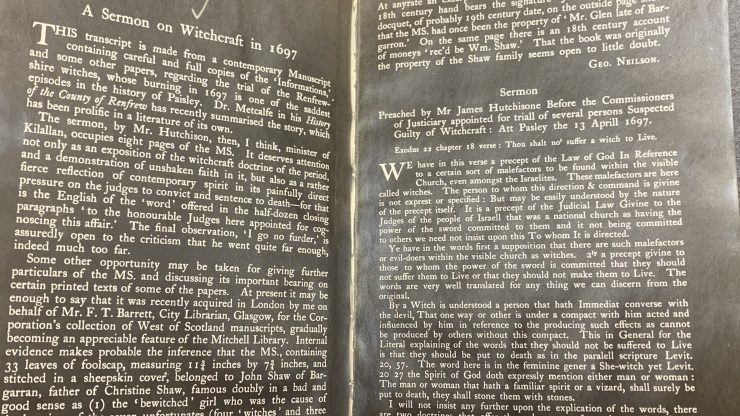Witchcraft in the Archives by Jim Hetherington – January 29, 2019
back to the Special Collections Blog

James Hutchisone preached in court on April 13th, 1697, addressing seven “unfortunates” condemned to die for their occult activity and bewitching of a girl. As the minister of Kilallan, he spoke before the judges to pressure the conviction and death sentence of four witches and three warlocks. The sermon transcribed onto that booklet is introduced by Geo Neilson, informing the readers of the “contemporary spirit” that lies within the minister’s words. Here, contemporary is modifying spirit, that is to say, we must be in tune with all that life hands to us. The aforementioned “painfully direct pressure on the judges to convict and sentence to death” snippet placed before the sermon in this manuscript sums up how black and white the dichotomy of angels and demons is.
Hutchisone guides the audience to understand that witchcraft is a construct of Satan, and so are the practitioners. The sleight of hand in Neilson’s sermon falls where he divides the populace. To him, we are from the ground up of devilrie or of God’s spirit, alienating the witchcraft and solidifying the judge, jury, an all’s “covenant with God as well as the parents.” And he spoke his mind. No longer are we contrasting the occult and a man in the sky, but parenthood is woven in to evoke emotion and memory of being raised and having a guiding force to appease our authorities. Hutchisone even compares the “Honourable Judges” to Gods, saying they are among the “mightie,” passing judgment on the condemned. With all due respect the preacher’s argument was flimsy, lacking a complete look at the crime on the table. The witches and warlocks were underrepresented, compared to sin and not in the least bit humanized as functioning members of society. Their occult crime in 1697 centuries ago was not honed in on, in fact, the preacher man was building an army to renounce Satan when the myths and rituals of the specific seven witches remained untold. The trial called for reason, not ranting around. Within this particular work, the power of suggestion influences the crowds to source their life and even themselves to a good or bad seed. Nowadays, the prosecution of these witches and warlocks would be secular: justice not Jesus.
Here in the George Fraser Black Collection, it is clear as day that witchcraft is much like fiction, yet it was practiced like calls to prayer or based on early texts that can be found in Drew University Special Collections. Witchcraft, or Wicca, is much like a religion. It propels followers to engage in symbolism and calls of prayer. Anyways, crimes are crimes and stealing items for a ritual or engaging in other illegal activity is one way to get locked up or worse, especially back then. Christianity is indeed in the mix here. The moral is to tread lightly especially amongst supernatural thoughts and ways. What at first seems like a shortcut (like a spell) evolves into a chosen God’s glory “bring[ing] their works of darkness to light.”